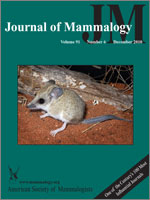Habitat fragmentation is a major cause of population reduction and loss, and increasing evidence suggests that effects of fragmentation on populations vary as a function of the life history and autecology of species. We investigated the effect of anthropogenic habitat fragmentation on several indicators of population health in the agile antechinus (Antechinus agilis), a small Australian marsupial with an unusual life history. We examined relative abundance, body condition (mass–size residuals [MSR]), and ectoparasite load. Abundance was 2.3-fold higher in continuous than in fragmented Eucalyptus forest, and ectoparasite loads were higher in fragmented than in continuous forest in March, April, May, and July, but not in June or August. Unexpectedly, MSR also was higher in what would usually be considered the less-favorable fragmented habitat than in continuous forest (means: fragmented: 0.6 g; continuous: −0.9 g). Other body-condition indicators did not differ consistently between fragmented and continuous forest populations. Results suggest that an apparently common and secure small mammal species could be declining in anthropogenically fragmented and degraded habitat. Although habitat fragmentation has been associated with nutritional stress in vertebrates, food availability probably was not contributing to the lower abundance of agile antechinus in habitat fragments. The findings indicate that care is needed when generalized expectations about the response of a species to anthropogenic habitat fragmentation are used to inform conservation management.
How to translate text using browser tools
16 December 2010
Impact of anthropogenic habitat fragmentation on population health in a small, carnivorous marsupial
Christopher P. Johnstone,
Richard D. Reina,
Alan Lill
ACCESS THE FULL ARTICLE

Journal of Mammalogy
Vol. 91 • No. 6
December 2010
Vol. 91 • No. 6
December 2010
abundance
Antechinus
anthropogenic effects
body condition
degradation
ectoparasite
fragmentation




